Corrected at 4:30pm, 30 Sept 2009
IN April 2009, the Selangor Islamic Affairs Council (MAIS) officially forbade the Ahmadiyah community in the state from performing their own Friday prayers. This news, however, did not make headlines — after all, there are at most only 2,000 Ahmadiyah in all of Malaysia, and at most only 600 in the Klang Valley. But from the panic-inducing headlines in the Malay-language press, one would think that the Ahmadiyah were an insidious fanatical sect bent on destroying the faith of Sunni Muslims in Malaysia.
(Corrected) The Ahmadiyah sect started in Qadian, in what is present-day India, in the late 19th century. They were inspired by the teachings of Mirza Ghulam Ahmad. However, there emerged two sects of the Ahmadiyah movement after Mirza Ghulam Ahmad’s death in 1908. There is the Lahore Ahmadiyah movement, which is inspired by his teachings but does not regard him as a prophet. Then there is the Ahmadiyah Muslim Community (AMC), sometimes referred to by other Muslims as “Qadianis”, which regards him as a prophet and messianic figure.
Majoritarian Islam does not have problems with the Lahore sect, but sees the AMC as heretical. Overall, there are nearly 200 million Ahmadiyah followers around the world. Ahmadiyah in Malaysia are part of the AMC.
The Ahmadiyah movement in Malaysia began shortly before the Second World War. Persecution began almost immediately. In the 1950s, the sultan of Selangor had an audience with the community’s leaders together with other Muslim leaders. However, things did not come to a head until 1975, when the Selangor Fatwa Council issued a fatwa declaring Ahmadiyah as non-Muslims. The fatwa called for them to repent, failing which they should be put to death by the ruler.
Malaysia is not the only country in which Ahmadiya face problems. Pakistan and Indonesia have seen a rise in violence and state persecution of Ahmadiya, too. Ironically, Ahmadiya thrive best in secular, Western countries such as Canada and the UK, where they are visited and protected by prominent ministers and members of Parliament.
In this first of a three-part series, The Nut Graph examines what the Ahmadiya are all about, and why they are deemed to be a threat. ![]()
See also:
A day with the “deviants”




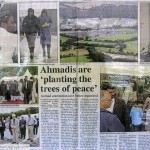
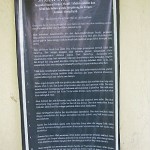


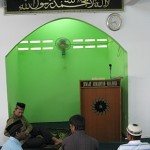
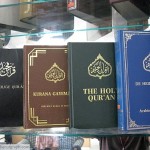




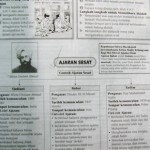
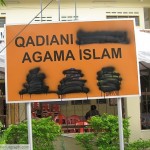



siew eng says
Thanks for the story. Tak tahupun sebelum ini there’s such religious persecution going on in Selangor. So steadfast of the Ahmadiyans to tahan sabar in the face of all the harassment and threats, and still support the authorities by reporting the vandalised signage and requesting for dialogue. The general Malaysian understanding of what is Islam is so bigoted. And isn’t it insulting to the Bahais to have their religion listed as “ajaran sesat” in the secondary school text book? Wonder how Bahai students face the mockings, disrespect and scorn that may come from that.
tzeyeng says
When I first understood that there is “no one Islam”, I was bowled over. I gradually began to understand that the pursuit of determining “the one true Islam” in Malaysia is also a quest for power. I am looking forward to this series! Thanks, TNG!
Eric says
It appears that in Malaysia, lawyers can appoint judges and no action will be taken, unidentified police can remove the legally-elected Speaker from a legislative assembly and no action will be taken, the cabinet can agree to spend billions in a white elephant project and action will solely be taken against the whistleblower.
By contrast, try to have a different version of religion without affecting any third party and action will DEFINITELY be taken.
How sick is this country becoming? Malaysian citizens wake up!
Main says
Hopefully the rest of the story will deal the truth on why Islam claims others as ‘non-[Muslim]’. And since there are two factions of Ahmadiyah, really careful and in-depth explanation is needed.
Actually, this is the first time I heard of factions in Ahmadiyah.
Be very careful man.
Farouq Omaro says
There are many different denominations in Islam. The Druze of Lebanon for example consider themselves Muslims, but other Muslims consider them as not. Their holy book includes both the Bible and the Quran. Then there are the Alevi Muslims who make up between 15%-20% of Turkey’s population. They believe that not everything in the Quran is true! Their prayer halls allow men and women to sit together and prayers include singing sessions. Then there are the Ismaili Shi’ites who have their own “Pope”, called the Aga Khan. The Aga Khan has the authority to interpret the Quran to suit modern times! Then we have the pro-Quran Muslims in Malaysia (popularly referred to as anti-Hadis) by the authorities. They accept only the Quran as the authority in Islam, and reject traditions which contradict the Quran! So, you see, Islam is as colourful as any other religion. Unfortunately, in Malaysia, Muslims are not free to express themselves. In the end, some choose to leave.
J-Ho says
The number of Bahai devotees is more than Sikhs in Malaysia. And yet people are not [necessarily] aware of Bahai.
benny says
Same here. I didn’t even know the existence of Ahmadiyah. So sad they can’t practice their faith freely.
Mera Silu says
I am looking forward to see how Shanon is trying to potray Qadianis. Yes, it seems that The Nut Graph and Shanon are promoting Qadianis as normal [Muslims] and are trying to confuse these Chinese and Indian [Malaysians] into believing that everything is wrong with Malay [Malaysians], Islam, Umno and BN.
Raja Abdul Razak says
Are there many ‘non-orthodox’ Muslims and sects in Malaysia? Also, the fact that you can exit the Almadiyah freely is a little misleading and requires careful reading. In Malaysia, if you are born a Muslim you remain one until you die, irrespective of what Islamic sects you choose to join and then leave. I stand corrected on this.
Dr Syed Alwi says
Dear people,
I think that you must first understand that in Islam – there are no more prophets after Prophet Muhammad. The Qadianis cannot therefore claim that their beliefs are Islamic. Therefore they should call themselves by any other name – except as Islam or Muslims. They are not.
Perhaps when they are prepared to do that, the Muslim majority would leave them alone. Having said that – I also want to add that I deplore any persecution in Muslim countries – be they against non-Muslims or otherwise.
Regards
Dr Syed Alwi
aidila says
Thank you for this insightful series of articles. What I would like to know is, do the Ahmadiya consider themselves to be Muslims (i.e. a follower of a different sect of Islam) or to be followers of a completely different religion?
Karcy says
To Raja Abdul Razak:
Malaysian religious authorities have declared 57 movements as “ajaran sesat” or deviant / heretical teaching in the country. The list includes some really random things like yoga, outcasted reformers, and Shiites, but the majority seems to be a slew of really bizarre cults.
http://drhalimahali.wordpress.com/2009/09/22/ajaran-sesat-di-malaysia/ has a list up to 56.
kassim says
If you believe in God but Jesus is not the son of God, then you can be of any religion but Christianity. Similarly if you believe in one God but Muhammad is not the messenger, then you can be of any religion but Islam. Form any new religion if you want to, but respect the fact that you cannot borrow parts of any existing religion.
Karcy says
Kassim,
One correction: there are indeed some Christians who do not believe that Jesus is Son of God, although they are a minority. The Jehovah’s Witnesses is one sect / denomination today.
Adam says
Just as there are so many different denominations in Christianity such as Catholics, Baptists, Methodists, Anglicans, etc., there are different versions or practices of the Muslim faith. The Shias are as Muslim as the Sunnis or the Wahhabis or the Sufis. It is most difficult to monopolise any religion. Over the years, there would surely be variations in the various practices and rituals due to cultural differences and influences.
Therefore, we should take a more compromising and tolerant approach to beliefs. If persecution takes place, people suffer. It is sad to make people suffer for their different beliefs.
ys says
Are we all too bogged down by what is “Islam”, what is “Christianity”, and who should lay claim on these labels? Religious bodies/authorities who try to uphold their belief that “my God is the only God” more often create rifts while justifying that they are the “norm” or the majority.
Religious institutions are a function of power, which means those in power (in most cases the majority) dictate the truth: the ones who have the language skills, the ability to translate words/thoughts, the means to publish and distribute.
I respect your belief in the texts written some 2,000 years ago and to interprete the text using your own justifications, as long as it does not promote violence or agony to others who do not share the same belief. While there should only be one truth, there are many interpretations. We observe how history books get changed by those in power, so how do we know if what’s printed today is the truth? And why would we hold on tightly to the same interpretation of ancient times?
Why aren’t we applying the “values” taught by our religions? In the course of civilisation, why have we not learnt to respect each other?
wan zaharizan says
[…] Anyway to those who want to know there is a debate going on of the the idea of ‘nabi’, whether it stopped at Muhammad pbuh. Many ulama agreed that Muhammad is the last messenger and to me being a Muslim it is one of the [foundations of our faith]. Our ‘iman’ requires absolute faith in it. But when it comes to “Nabi” or Apostle, that is debatable. We as Muslims believe there are 124,000 Apostles sent to the earth and 313 messengers, the last being Muhammad pbuh. That is greed upon. Because of this loophole many claim they are “Nabi” but not prophets thus they do not bring a new religion but a new version. Does this affect the aqidah of Muslims – that depends on the new version. Just like the Arqam belief in the Mahdi [or messianic figure] etc – does it affect the faith? It is a perplexing question which takes a long time for me to debate but I hope Shanon Shah would investigate on it.
For me when I took the baith or the pledge when I recite the syahadah, it is a pledge I must honour and not defile. As for apostasy, Raja Abdul Razak, enough said – in the Quran there is a verse that states there is no compulsion in religion. Thus you can apostate and [there is] no ruling in the Quran that says you must be put to death!
az nar says
As many as there are many people on this earth, there are many ideas, many beliefs. People are entitled to what they think is right. As long as there is no oppression and coercion. That is free will and that is reasonable because then people are accountable for what they do.
If people are forced to do things they don’t [believe] in, that wouldn’t be justifiable and therefore wrong. Yet, there are truly people who are monsters and evil and therefore have to be stopped.
What is peace and what is freedom? Are these absolute? In living and in death, ultimately the truth will be shown. The sad fact is not everybody is right [and not] everybody can win since there is only one prize. Do you gamble with your life or or do you see the light at the end of the tunnel and do something to get to that light.
Some people don’t believe that the light even exists, so there is no point worrying about it. Yet there is so much darkness in this world. Is life meaningless and that we are all “accidents”? The truth is for those who deserve it, not more not less.
People can say whatever they like about others. What is important is the belief that you have in the soul. Decisions and choices to make, always, just because we cannot have everything. 72 sects for the Jews, 72 sects for the Christians and 73 sects for the Muslims … Pick the right door; you have free will. But do remember it is a one-way ticket and no money-back.
SST says
“Form any new religion if you want to, but respect the fact that you cannot borrow parts of any existing religion.”
May I know who “owns” the religion? Or is it copyrighted?
Munir Varraich says
At the turn of the 14th century Hijra, 1979/1980, and at the start of the 15th century Hijra, this issue of Ahmadiyah Muslims came to the forefront of the Muslim world. In 1974, Pakistan’s elected government of ZA Bhutto declared this community as non-Muslims. No sooner was that done, the ulama of the Muslim world spared no time in declaring them non-Muslims.
Are there some lessons to be learnt from this important event in the Muslim world? Did such an event happen in the past with the Judaic dispensation, when Jesus was put on the cross and his followers were declared heretics by the ulama (rabis) of those times. History is proof that the followers of Jesus progressed and the followers of the rabis were left behind.
Ahmadiyah Muslims are like the followers of Jesus, who in spite of being the followers of the Quranic teachings, are being declared as non-Muslims and being branded as Ahmadis, just like the followers of Jesus Christ came to be known as Christians.
My advice to the Ahmadis is to disassociate themselves from the mainstream Muslims and remain a minority focuses on your teachings, which in effect is an updated version of the Quranic teachings. To the Muslim world, my advice is to focus on their own brand of Islam, if you think it can get you the rightful place of bygone days in the modern world.
MAV
Sweden
dilandinga says
I bookmarked this link. Thank you for a good job!